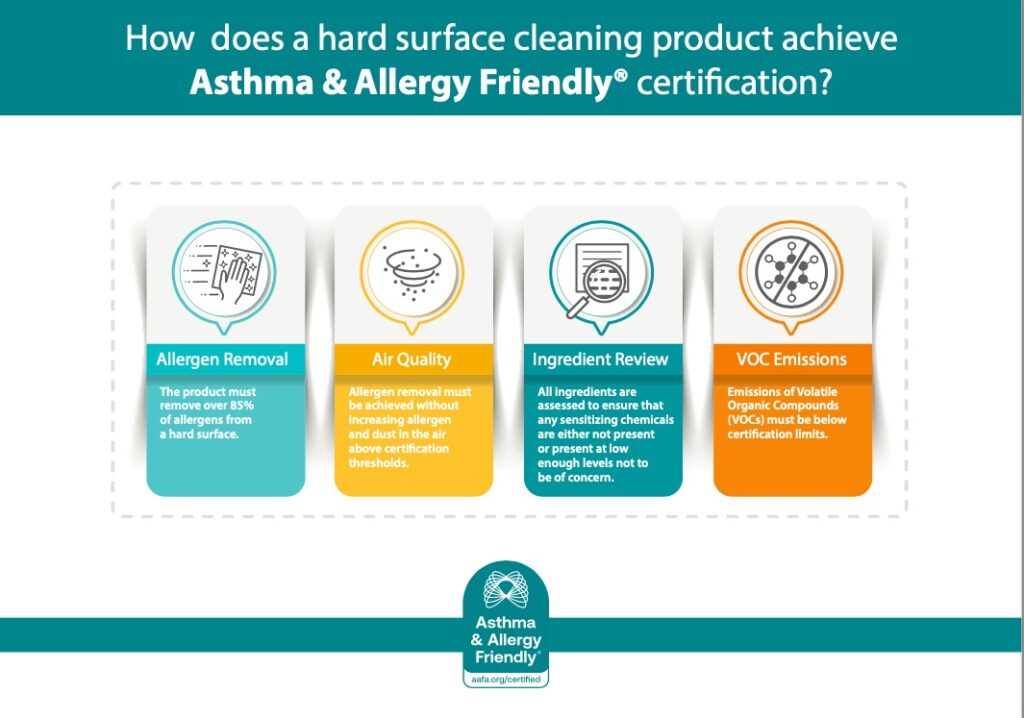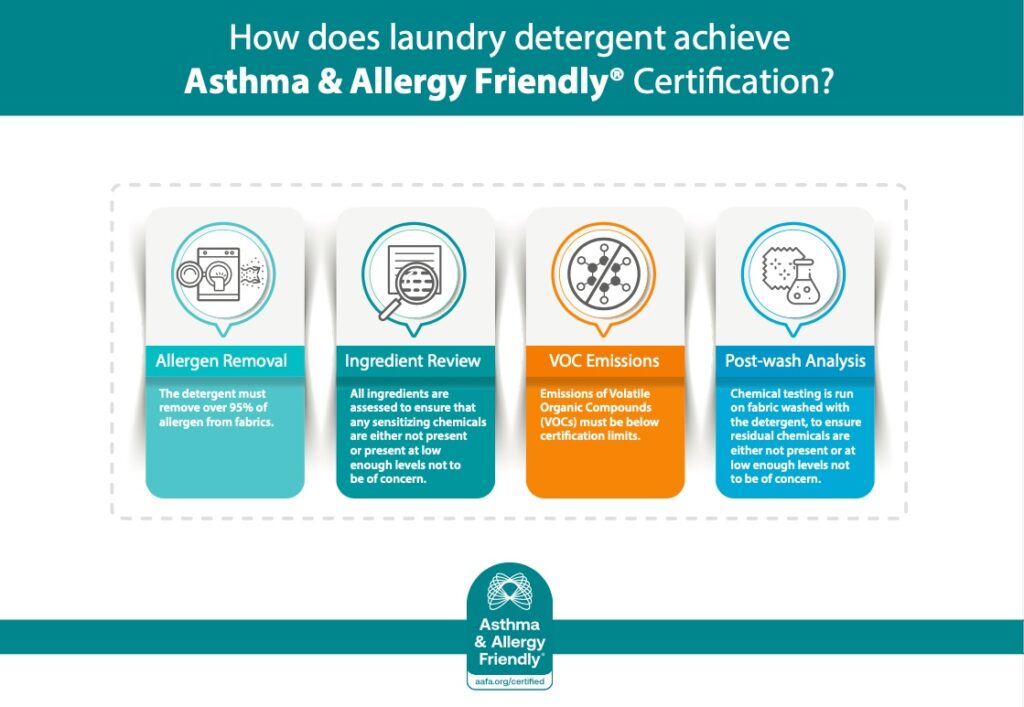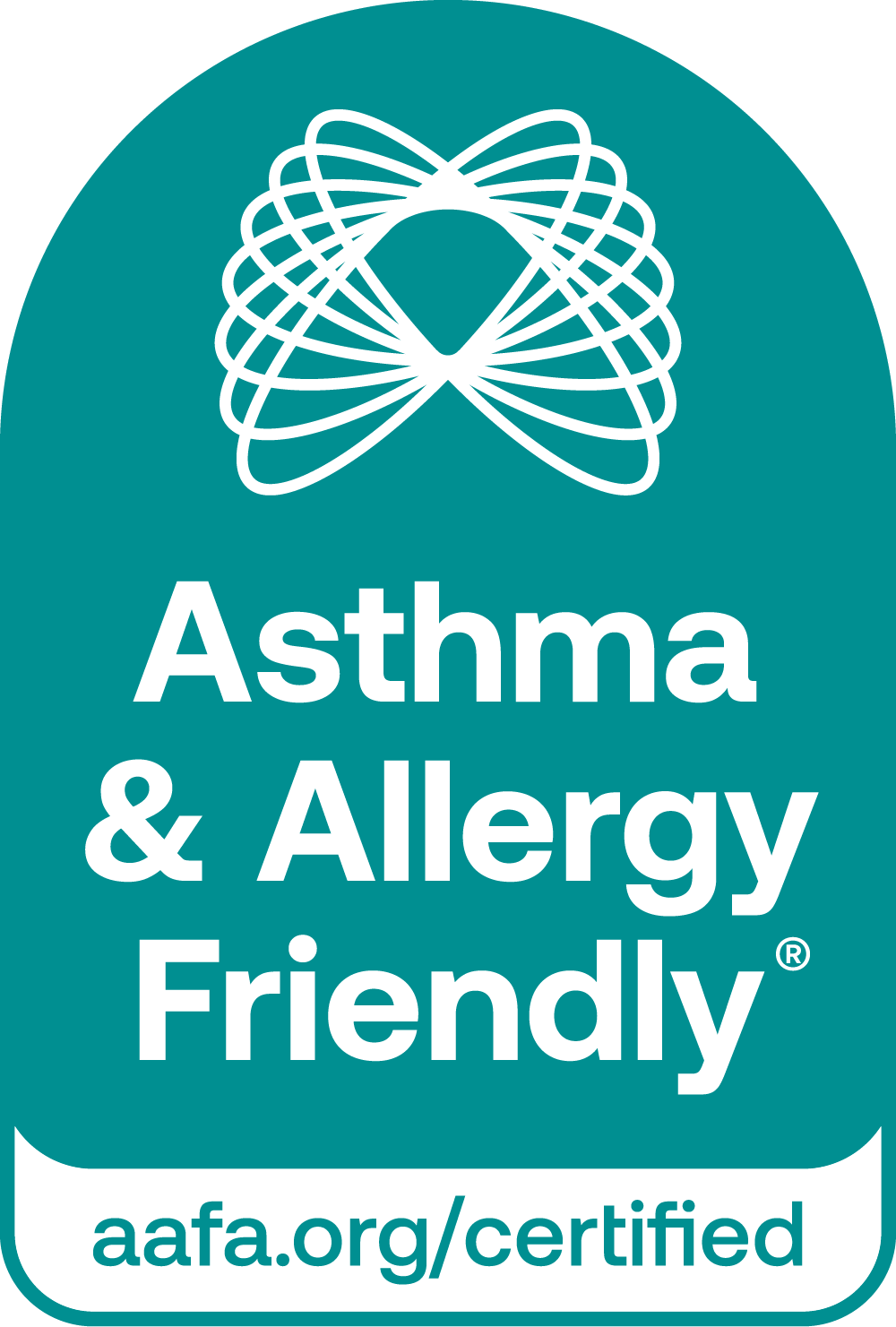Choosing Certified cleaning products can significantly reduce allergens and potentially harmful chemicals in your home, supporting a healthier indoor environment
As we enter the final two weeks of Asthma and Allergy Awareness Month, we’ve already explored how key products like paint, air purifiers, HVAC filters, washing machines, and bedding contribute to healthier indoor air quality (IAQ). Now, let’s focus on cleaning products, an essential part of managing allergens and maintaining a healthy home environment, especially for those with asthma and allergies.
Choosing Certified Asthma & Allergy Friendly® cleaning products and maintaining an effective cleaning routine can significantly improve IAQ, helping to reduce allergens and potentially harmful chemicals that can trigger asthma attacks and allergic reactions. In this article, we’ll explore how effective cleaning products can impact IAQ and why choosing science-backed products is an important step toward a healthier indoor environment.
Why Cleaning Matters for Better Indoor Air Quality
We spend the majority of our time indoors, so the quality of the air we breathe at home is essential to our health. Poor IAQ can be caused by common allergens like dust mite allergen, pet dander, and pollen, as well as chemicals from cleaning products. For individuals with asthma or allergies, exposure to these airborne pollutants can trigger symptoms such as sneezing, coughing, or difficulty breathing. But even for those without respiratory conditions, long-term exposure to poor IAQ can lead to headaches, fatigue, and other health issues.
Reducing allergens and avoiding harmful chemicals in cleaning products can improve IAQ and create a healthier environment for everyone in the home. This is especially important when you consider that 90% of dust in homes contains harmful chemicals, including flame retardants, and that indoor air pollutant levels can be 2 to 5 times higher than outdoor levels, sometimes even exceeding them by 100 times during certain activities.
How Effective Cleaning Routines Affect Indoor Air Quality
Maintaining a regular cleaning routine is crucial for improving IAQ by eliminating dirt, dust, and allergens that accumulate on surfaces. Cleaning for health, not just appearance, is key. Regular dusting with a moist cloth helps remove dust and allergens from hard surfaces without redistributing them into the air. Vacuuming with a validated high-efficiency particulate air (HEPA) filter is also essential for reducing allergens from carpets and floors.
Proper ventilation is important during and after cleaning to ensure harmful chemicals and particles don’t remain in the air. Following the manufacturer’s instructions for cleaning products can also help avoid the release of pollutants caused by chemical reactions.
In addition to regular cleaning, preventing mold growth is crucial for maintaining good indoor air quality. Mold can thrive in damp environments, making it essential to remove any mold-damaged materials and thoroughly clean areas affected by mold.
Reducing clutter is another important step, as clutter can harbor dust and allergens, making cleaning more difficult and allowing particles to become airborne. By decluttering and organizing your space, you make it easier to clean effectively and reduce potential allergens in your home.
How Cleaning Products Impact Indoor Air Quality
Cleaning products can impact IAQ in two main ways: through the removal or redistribution of allergens and through the release of chemicals, particularly volatile organic compounds (VOCs).
Allergen Removal: Cleaning products play a crucial role in removing allergens from surfaces like countertops, floors, and fabrics. Effective products capture and remove allergens without sending them back into the air.
Chemical Emissions: Many cleaning products release VOCs into the air, which can contribute to poor indoor air quality. VOCs are chemicals that easily become gases and can lead to both short and long-term health effects.
Hard Surface Cleaning Products
Hard surface cleaning products are commonly used to clean areas such as kitchen counters, bathrooms, and floors. However, not all cleaning products are created equal in terms of their impact on IAQ. The Asthma & Allergy Friendly® Certification Program certifies hard surface cleaning products that meet stringent standards to ensure they are a more suitable choice for those with asthma and allergies, making them also a wise choice for better indoor air for the whole family.
To achieve Asthma & Allergy Friendly® Certification, hard surface cleaning products must meet the following criteria:
- Allergen Removal: The product must remove over 85% of allergens from hard surfaces, ensuring that allergens like dust mite debris, pet dander, and pollen are effectively removed.
- Air Quality: The product must clean surfaces without increasing the amount of allergen and dust in the air above certification thresholds, ensuring that allergens are removed rather than redistributed.
- Ingredient Review: All ingredients in the product are reviewed to ensure that any sensitizing chemicals are either not present or present at levels low enough not to cause concern.
- VOC Emissions: The product’s VOC emissions must be below the certification limits, ensuring minimal impact on IAQ.
By choosing a hard surface cleaning product that is CERTIFIED Asthma & Allergy Friendly®, you can have peace of mind knowing that the product has been rigorously tested for both allergen removal and chemical levels.

What does it take for a hard surface cleaner to become Certified Asthma & Allergy Friendly®? It must pass rigorous testing for allergen removal, ingredient safety, and VOC emissions to support healthier indoor air.
Laundry Detergents
Laundry detergents also play a crucial role in indoor air quality, especially as fabrics can trap allergens like dust mite allergen and pet dander. The Asthma & Allergy Friendly® Certification Program subjects laundry detergents to biological, physical, and chemical testing to ensure they are effective in reducing allergens without contributing to poor IAQ.
CERTIFIED laundry detergents are tested for the following:
- Allergen and Dust Removal: Laundry detergents are assessed for their ability to remove allergens from fabrics. This involves testing fabrics seeded with allergen-containing dust and comparing them to unwashed controls to ensure significant allergen reduction post-washing.
- Ingredient Review: The chemicals used in the laundry detergent are carefully reviewed to ensure they are non-sensitizing and non-allergenic.
- VOC Emissions: Laundry detergents are tested in an environmentally controlled chamber to measure the VOCs released over a 14-day period. Certification requires VOC levels to remain below strict certification limits.
- Post-wash Analysis: After washing, the levels of any residual allergenic, irritant, or banned chemicals left on the fabric must be either not present or at low enough levels not to be of concern.

How does laundry detergent become Certified Asthma & Allergy Friendly®? It must pass strict scientific testing across four key areas to support healthier homes
Handheld Dusters
Handheld dusting products and wipes are another cleaning tool that can influence indoor air quality. Dusting can often release particles into the air, but Certified Asthma & Allergy Friendly® handheld dusters are scientifically tested to remove allergens while minimizing airborne dust.
CERTIFIED handheld dusters must:
- Remove allergens from surfaces effectively.
- Maintain low airborne particle concentrations during use.
- Contain constituents that are as low as possible in allergenic and sensitizing chemicals.
- Must not emit levels of VOCs above strict certification limits
Introducing Our Certified Partners: Renegade Brands and Guardsman Dusting Cloths
We are proud to work with Renegade Brands and Guardsman Dusting Cloths, two of our trusted Certified partners, both of whom are committed to improving IAQ through scientifically validated cleaning products.
Renegade Brands: By reducing allergens and sensitizing chemicals, Renegade Brands is helping to create healthier homes. Renegade Brands showcased its Sweat-X Free and Clear detergent at the American Academy of Allergy, Asthma & Immunology (AAAAI) / World Allergy Organization Joint Congress in 2025. The recognition at these medical events shows how certified consumer products are bridging the gap between scientific research, healthcare, and everyday consumer choices.
Their involvement in initiatives like George to the Rescue, showed how cleaning products are a fundamental aspect of the “whole home approach” to allergen control and highlighted their dedication to improving indoor environments for families affected by asthma and allergies. Renegade Brands also has certified its commercial line of Pro-Clean PurePro laundry detergent, an effective solution for hospitality and healthcare laundry systems.
Guardsman Dusting Cloths: Guardsman has been a leader in furniture care since 1915 and has offered Certified Asthma & Allergy Friendly® dusting cloths since 2018. Their cloths effectively remove allergens from surfaces while emitting extremely low levels of VOCs during use, helping to reduce allergen concentrations in the air, ensuring they are a great choice for individuals with asthma and allergies.
The Importance of Third-Party Certification
In a market flooded with cleaning products, it’s important to be aware that not all claims about health and indoor air quality are backed by science. Terms like “hypoallergenic” are often used as marketing tools, but they are largely unregulated and can be misleading. Manufacturers are free to use the term without needing to prove their claims.
This is where third-party certification becomes invaluable. Independent certifications, such as the Asthma & Allergy Friendly® Certification Program, go beyond marketing claims by subjecting products to scientifically strict testing to ensure that they meet rigorous standards. By choosing products that are independently tested and certified, you can trust that they have been proven to perform as advertised.
Conclusion
As we celebrate Asthma and Allergy Awareness Month, it’s an ideal time to evaluate the cleaning products in your home. By choosing Certified Asthma & Allergy Friendly® products from trusted brands like Renegade Brands and Guardsman, you can make a significant difference in reducing allergens and improving indoor air quality. With over 90% of dust in homes containing harmful chemicals, it’s essential to use cleaning products that help protect your health while maintaining a clean and comfortable living space.
